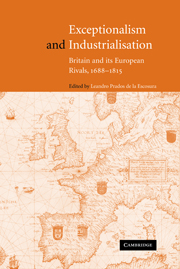Book contents
- Frontmatter
- Contents
- List of tables and figures
- List of contributors
- Acknowledgements
- Introduction: Was British industrialisation exceptional?
- Part I The origins of British primacy
- Part II Agriculture and industrialisation
- Part III Technological change
- Part IV Institutions and growth
- Part V War and Hegemony
- Conclusions
- Institutional change and British supremacy, 1650–1850: some reflections
- Laudatio patritii. Patrick O'Brien and European economic history
- References
- Index
Laudatio patritii. Patrick O'Brien and European economic history
Published online by Cambridge University Press: 04 December 2009
- Frontmatter
- Contents
- List of tables and figures
- List of contributors
- Acknowledgements
- Introduction: Was British industrialisation exceptional?
- Part I The origins of British primacy
- Part II Agriculture and industrialisation
- Part III Technological change
- Part IV Institutions and growth
- Part V War and Hegemony
- Conclusions
- Institutional change and British supremacy, 1650–1850: some reflections
- Laudatio patritii. Patrick O'Brien and European economic history
- References
- Index
Summary
A tradition going back to the Middle Ages prescribes that symposia celebrating a distinguished scholar end with the latter's laudatio. It is for me both an honour and a pleasure to perform this task. My friendship with Patrick dates back to 1977 when he introduced me to St Antony's, my intellectual home for years to come.
Unfortunately, this laudatio will be the least original of all the papers collected in this book. We are all members of a community that has long drawn upon Patrick's intellectual and personal gifts. We all have studied his books and papers, learned from his lectures and seminars, benefited from his advice, relished his wit, delighted in his company. And many of us have experienced the warmth of his loyal friendship. Can I possibly add anything new to all this?
My task is made even more difficult by the fact that I am no expert of British economic history. I am, however, encouraged by the width of Patrick's scholarship, his contribution to our understanding of economic history being by no means confined to his country of origin. Even so, a full, if cursory, review of Patrick O'Brien's work is beyond my capability. The sheer quantity of his production – fifty-three papers in the last decade alone – defies any attempt by this laudatio to systematically analyse Patrick's work. Let me just recall that Patrick's first published papers dealt with the economic history of Britain and Egypt.
- Type
- Chapter
- Information
- Exceptionalism and IndustrialisationBritain and its European Rivals, 1688–1815, pp. 283 - 293Publisher: Cambridge University PressPrint publication year: 2004



